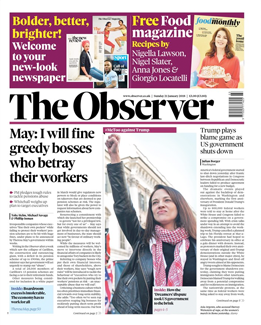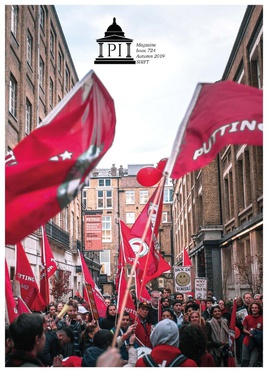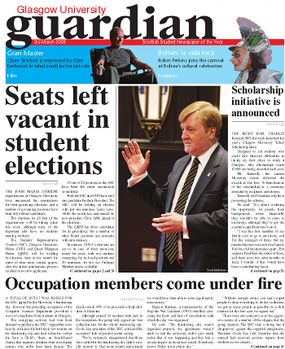
The Independent is a British online newspaper. It was established in 1986 as a national morning printed paper. Nicknamed the Indy, it began as a broadsheet and changed to tabloid format in 2003. The last printed edition was published on Saturday 26 March 2016, leaving only the online edition.

The Observer is a British newspaper published on Sundays. It is a sister paper to The Guardian and The Guardian Weekly, having been acquired by their parent company, Guardian Media Group Limited, in 1993. First published in 1791, it is the world's oldest Sunday newspaper.

A student publication is a media outlet such as a newspaper, magazine, television show, or radio station produced by students at an educational institution. These publications typically cover local and school-related news, but they may also report on national or international news as well. Most student publications are either part of a curricular class or run as an extracurricular activity.

Varsity is the oldest of Cambridge University's main student newspapers. It has been published continuously since 1947 and is one of only three fully independent student newspapers in the UK. It moved back to being a weekly publication in Michaelmas 2015, and is published every Friday during term time.

Loaded was a men's lifestyle magazine. It launched as a mass-market print publication in 1994, ceased being issued in March 2015, but relaunched as a digital magazine on 11 November 2015. The content later changed, with semi-clothed women becoming absent.

Nouse is a student newspaper and website at the University of York. It is the oldest registered society of, and funded by, the University of York Students' Union. Nouse was founded in 1964 by student Nigel Fountain, some twenty years before its rival York Vision. The newspaper is printed three times in each of the Autumn and Spring terms, and twice in the Summer term, with frequent website updates in between print runs. As of June 2022, Nouse has printed 500 editions.

UCL Pi Media is the oldest and largest student journalism society at University College London Union. Initially launched as a newspaper in 1946 and named after former Provost David Pye, it now publishes on three platforms: Pi Online, Pi Magazine and PiTV.

The Boar is the student newspaper of the University of Warwick. Founded in 1973, the paper is published thrice a term, and the website is continually updated. Whilst it is affiliated to the university's Students' Union, the paper is editorially independent. It consists of 16 sections, including News, Sports, and Podcasts.

The Glasgow Guardian is the student newspaper of the University of Glasgow.

Felix is the student newspaper of Imperial College London. The newspaper is published weekly during term time with approximately 30 issues per year, and is distributed around the various Imperial College campuses.

Exeposé is the official student-run newspaper of the University of Exeter. With an estimated print circulation of around 3,500. Exeposé is free and published fortnightly during term time. Its sections include news, features, lifestyle, science, satire, sport, screen, music, arts and lit, tech, comment and international.
Jeff William Randall is an English former business journalist and presenter, who presented Jeff Randall Live, a business and politics show on Sky News, until stepping down from his role in March 2014. He was a columnist for The Daily Telegraph, and was the first business editor at BBC News.
Press Gazette, formerly known as UK Press Gazette (UKPG), is a British trade magazine dedicated to journalism and the press. First published in 1965, it had a circulation of about 2,500 before becoming online-only in 2013. Published with the strapline "Future of Media", it covers news about newspapers, magazines, TV, radio, and the online press, dealing with launches, closures, moves, legislation and technological advances affecting journalists.

The UCSDGuardian is a student-operated newspaper at the University of California, San Diego. Originally named the Triton Times, it is published once a week during the regular academic year, usually Mondays. Although The Guardian is officially a university department, it is funded solely by advertising. Unlike many college newspapers, The Guardian has no faculty advisor and is not formally tied to any academic program.

Palatinate is the student newspaper of Durham University. One of Britain's oldest student publications, Palatinate is frequently ranked as one of the leading student outlets in the UK and Ireland, winning Best Publication in the Student Publication Association's 2018 and 2021 national awards. In the same year Palatinate was Highly Commended in the Best Publication category of the BBC Radio 4 Today Programme's Student Journalism Awards. Several of its editors have gone on to gain national recognition in journalism.
The Guardian Student Media Awards were an annual UK-wide student journalism competition run by The Guardian newspaper. They were cancelled from 2016 onwards to save costs.

Sunday Business was a national Sunday broadsheet financial newspaper published in the United Kingdom, which ran from 1996 to 2006, when it was turned into a magazine called The Business.
The National Student Journalism Awards are an annual UK-wide student journalism competition organised by the National Union of Students of the United Kingdom (NUS).

The Guardian is a British daily newspaper. It was founded in 1821 as The Manchester Guardian, before it changed its name in 1959. Along with its sister papers, The Observer and The Guardian Weekly, The Guardian is part of the Guardian Media Group, owned by the Scott Trust Limited. The trust was created in 1936 to "secure the financial and editorial independence of The Guardian in perpetuity and to safeguard the journalistic freedom and liberal values of The Guardian free from commercial or political interference". The trust was converted into a limited company in 2008, with a constitution written so as to maintain for The Guardian the same protections as were built into the structure of the Scott Trust by its creators. Profits are reinvested in its journalism rather than distributed to owners or shareholders. It is considered a newspaper of record in the UK.
Concrete is the University of East Anglia's student newspaper. Concrete is free and published fortnightly on a Tuesday, during term time.
















